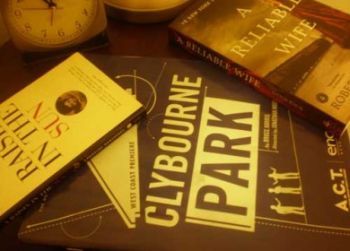
Publisher:
Bonnie King
CONTACT:
Newsroom@Salem-news.com
Advertising:
Adsales@Salem-news.com

~Truth~
~Justice~
~Peace~
TJP
Jun-22-2012 18:46

 TweetFollow @OregonNews
TweetFollow @OregonNews
From Raisin in the Sun to Clybourne Park
Ralph E. Stone Salem-News.comClybourne Park, the 2011 Pulitzer Prize winner and 2012 Tony Award winner for best play.
 "The story of American history is in private property." - quote from Clybourne Park character Alexis de Tocqueville |
(SAN FRANCISCO) - Juneteenth, also known as Freedom Day or Emancipation Day, is a holiday in the United States commemorating the announcement of the abolition of slavery in Texas in 1865. Celebrated on June 19, Juneteenth is a combination of the words June and nineteenth.
While it is a celebration, it should also be a remembrance of race and real estate, part of the dark side of Black history in this country.
Many, many years ago, I read and saw Lorraine Hansberry's play, Raisin in the Sun, which debuted on Broadway in 1959. The play concerns Walter and Ruth Younger and Walter's mother ( Mama). Mama received an insurance check for $10,000 and uses part of the money as a down payment on a new house, choosing all-white Clybourne Park in Chicago over a black neighborhood because it happened to be much cheaper. Meanwhile, Karl Lindner, a a weasly white representative of the neighborhood they plan to move into, makes a generous offer to buy them out. His ostensible reason: to avoid neighborhood tensions over interracial population. Walter is actually considering the buyout offer, but at the end of the play he changes his mind, announcing that the family is proud of who they are and will try to be good neighbors. The play closes with the family leaving for an uncertain future in their new home.
While in New York City earlier this year, I saw Clybourne Park, the 2011 Pulitzer Prize winner and 2012 Tony Award winner for best play. Bruce Norris, the playwright, borrows the character Karl Lindner from Raisin. In Norris's play, set is the house that Younger bought, we see the white couple who sold it to him being unsuccessfully petitioned by their neighbors not to sell to the Youngers. In the second act, set in 2009, Clybourne Park is now all-black, and a white couple who plans to buy the same house raises the specter of gentrification and the social upheaval it frequently engenders.
I assume that Mama or her immediate ancestors were part of the some six million African-Americans who left the south for about every other corner of the U.S. from about 1915 well into the 1970s, It was called the Great Migration. They were escaping the Jim Crow laws that enforced a rigid caste system throughout the South. The Great Migration did not end until the 1970s when the South finally began to change. The whites-only signs began to come down, the all-white schools admitted blacks, and everyone was allowed to vote. By the 1970s, some forty-seven percent of blacks were living outside the South, compared to ten percent when the Migration began. For example, in Chicago the black population went from about 44,000 before the Migration to more than one million. There are more blacks living in Chicago now than in the state of Mississippi.
Until the late 1960s, banks and savings and loan institutions overwhelmingly practiced "redlining." That is, they refused to make mortgage loans to African-Americans, no matter what their individual credit history.
Real-estate speculators bought low from whites and sold high to blacks. If blacks could not get mortgages, then how could they buy? The answer was to buy "on contract." On contract was an installment plan, which combines the worst of owning with the worst of renting. The buyer made a down payment and is responsible for taxes, insurance, interest, and property maintenance. But contract buyers, unlike mortgage buyers, got no equity in their property until it was paid in full. Properties sold on contract could be repossessed if the buyer missed even one monthly payment. You could pay $9,000 on a house priced at $9,500, miss a payment, and lose the property plus your down payment.
Buying on contract left the buyer in a vulnerable position. For one thing, the property was probably inflated. Yet, to own a house, blacks had no choice but to accept the deal. Black-Americans were often trapped. Because they bought at an inflated price, many husbands and wives worked two jobs to make their payments. They put off maintenance and often had to take in tenants.
Whites saw the deteriorating neighborhoods, overcrowded properties, declining maintenance, absent parents, and unsupervised children, but did not know the cause. As a result, whites fled, sold at a loss and moved to the suburbs. Their former houses were then sold at a mark up to African-Americans.
Title VIII of the Civil Rights Act of 1968 (Fair Housing Act), as amended, 42 U.S.C. 3601-3619, now prohibits redlining when the criteria for redlining are based on race, religion, gender, familial status, disability, or ethnic origin.
Another unsavory practice was "blockbusting" where unsavory real estate speculators would scare white owners into fleeing their neighborhoods by selling to an African-American or spreading a rumor that an African-American was moving into the neighborhood.
In Clybourne Park a character quotes Alexis de Tocqueville, "The story of American history is in private property." And ever since, we have been attempting to resolve the problems of race and property.
-------------------------------
Tweet
Follow @OregonNews
 Salem-News.com writer Ralph E. Stone was born in Massachusetts. He is a graduate of both Middlebury College and Suffolk Law School. We are very fortunate to have this writer's talents in this troubling world; Ralph has an eye for detail that others miss. As is the case with many Salem-News.com writers, Ralph is an American Veteran who served in war. Ralph served his nation after college as a U.S. Army officer during the Vietnam war. After Vietnam, he went on to have a career with the Federal Trade Commission as an Attorney specializing in Consumer and Antitrust Law. Over the years, Ralph has traveled extensively with his wife Judi, taking in data from all over the world, which today adds to his collective knowledge about extremely important subjects like the economy and taxation. You can send Ralph an email at this address stonere@earthlink.net
Salem-News.com writer Ralph E. Stone was born in Massachusetts. He is a graduate of both Middlebury College and Suffolk Law School. We are very fortunate to have this writer's talents in this troubling world; Ralph has an eye for detail that others miss. As is the case with many Salem-News.com writers, Ralph is an American Veteran who served in war. Ralph served his nation after college as a U.S. Army officer during the Vietnam war. After Vietnam, he went on to have a career with the Federal Trade Commission as an Attorney specializing in Consumer and Antitrust Law. Over the years, Ralph has traveled extensively with his wife Judi, taking in data from all over the world, which today adds to his collective knowledge about extremely important subjects like the economy and taxation. You can send Ralph an email at this address stonere@earthlink.net
 |
 |
 |
 |
 |
 |
 |
Articles for June 21, 2012 | Articles for June 22, 2012 | Articles for June 23, 2012



Salem-News.com:
Quick Links
DINING
Willamette UniversityGoudy Commons Cafe
Dine on the Queen
Willamette Queen Sternwheeler
MUST SEE SALEM
Oregon Capitol ToursCapitol History Gateway
Willamette River Ride
Willamette Queen Sternwheeler
Historic Home Tours:
Deepwood Museum
The Bush House
Gaiety Hollow Garden
AUCTIONS - APPRAISALS
Auction Masters & AppraisalsCONSTRUCTION SERVICES
Roofing and ContractingSheridan, Ore.
ONLINE SHOPPING
Special Occasion DressesAdvertise with Salem-News
Contact:AdSales@Salem-News.com

Terms of Service | Privacy Policy
All comments and messages are approved by people and self promotional links or unacceptable comments are denied.
[Return to Top]
©2026 Salem-News.com. All opinions expressed in this article are those of the author and do not necessarily reflect those of Salem-News.com.